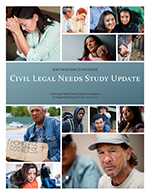Welcoming a Prominent Advocate for Equal Access to Justice
In April 2016, DWT was pleased to welcome a new partner to the firm: former U.S. Attorney John McKay, who joined as chair of our government investigations and crisis management group.
In addition to his extensive experience spearheading civil and criminal investigations, as well as representing clients in complex commercial litigation while in private practice, McKay brings to the firm a long record of commitment to pro bono work and the cause of civil legal assistance.
"I started off as a prosecutor," says McKay, "and I could see immediately the consequences of people not having sufficient access to civil legal representation. We could criminally prosecute in domestic violence cases, for example, but that didn’t address the fact that no one was getting child support, or medical care wasn’t being received, or a child was being denied education because of a disability. From my first week in private practice I started taking pro bono cases. I knew I wanted to help represent low-income people."
In addition to taking on individual cases, McKay has sought to tackle the larger challenge on a local, national and international level. In the mid-1990s he served as founding chair of the Equal Justice Coalition, which advocates for civil legal aid in Washington state. He then served for four years as president of Legal Services Corporation, the Washington, D.C.-based, federally chartered nonprofit that funds and monitors free civil legal aid throughout the U.S. More recently, he oversaw a two-year Justice Sector Assistance Project for the U.S. Department of State, helping to support the rule of law in the Palestinian territories.
McKay’s many awards include the Washington State Bar Association’s 1995 Pro Bono Lawyer of the Year award and the bar’s Award of Merit (its highest honor). In 2008, McKay, along with his brother Mike, was awarded the prestigious Charles A. Goldmark Award for Distinguished Service by the Legal Foundation of Washington, honoring his work to assure equal access to justice. In 2012, he received the Judge Learned Hand Award from the American Jewish Committee in recognition of his pursuit of justice and equality under the law.
 This past year, McKay has served as a statewide spokesperson for a comprehensive and troubling report on civil legal needs in Washington state. The survey, which was commissioned by the state Supreme Court and published in late 2015, found that the vast majority of low-income Washingtonians do not receive the legal help they need to solve problems such as access to health care, consumer finance and debt collection, and employment-related issues.
This past year, McKay has served as a statewide spokesperson for a comprehensive and troubling report on civil legal needs in Washington state. The survey, which was commissioned by the state Supreme Court and published in late 2015, found that the vast majority of low-income Washingtonians do not receive the legal help they need to solve problems such as access to health care, consumer finance and debt collection, and employment-related issues.
Based on the report, McKay and other advocates have called on the state to more than double the number of state-funded civil legal aid attorneys, as well as expand the level of volunteer attorney involvement in the delivery of essential civil legal aid services and build awareness of legal aid services in low-income communities.
"The number and complexity of legal challenges facing poor people have only increased in the last decade," says McKay. "There are too many people wandering around courthouses with no lawyer and no advocacy, and we know it doesn’t go well for people like that."
Since the publication of the report, McKay has spent many hours speaking to editorial boards about the issue of unmet civil legal needs and helping win extensive press coverage on the subject. He also led a presentation on the survey results before the Supreme Court justices.
According to the report’s rigorous research, Washington currently has just one state-funded legal aid attorney for every 10,783 eligible residents, which is less than half the nationally recognized minimal level of service.
"We’re way toward the bottom of the list of states that have made commitments to keep courthouse doors open for poor people," says McKay. "These are people who, but for the intervention of a lawyer, could be homeless. We need $25 million over the next five years to address that gap."
McKay says it’s essential to expand the work of organizations that can serve as referral sources for pro bono help, such as the Northwest Justice Project and Columbia Legal Services. "It’s very difficult for private lawyers to properly screen these cases," says McKay. "They need to come through an entity in order for busy lawyers to be able to volunteer their time."
